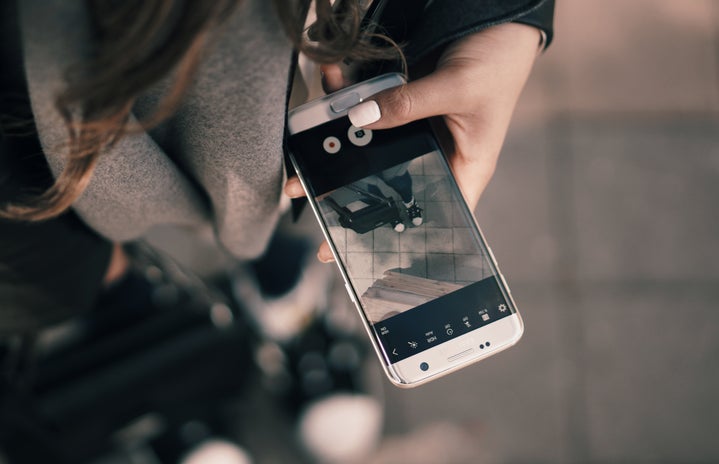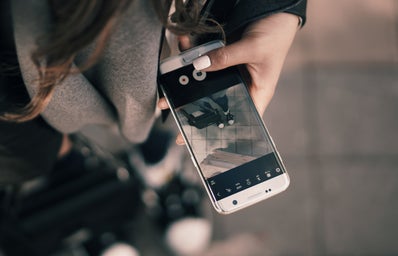The general consensus from some of my friends seems to be that I’m a pro, but honestly, I’m pretty much brand new to the world of photography. At least in some aspects. I’ve been dabbling in it since I was twelve or thirteen (I’m twenty now), but only since moving to Portland have I really gotten more into it. I’ve definitely been working toward it, starting out with a couple point-and-shoot cameras before getting my first “real” camera on my 16th birthday — a Canon Rebel t2i. Photography isn’t something that I was just immediately good at. It’s taken years to get where I am and I’m still learning more. Some of the technical aspects have helped me improve the quality of my photos, but personally I believe there’s way more to it. Honestly, when it gets down to the tech-y terminology, I’m lost half the time. After getting comments like, “I want to get into photography but I need a nice camera first,” and comments like, “I need a nice camera/editing system so I can get that blurred background,” I thought I’d make a list of tips that have helped me get past the misconceptions when I started delving further into my hobby a year ago.
Photo taken by Hannah Cantrell (@hannah_cantrell on instagram)
All photos below are taken by Sabrina Bernaldo-Olmedo (@sabrinamorgn on instagram). Canon Rebel t2i, 50mm f1.8 or 18-55mm lens, or iPhone 6. Edited in Lightroom, Photoshop, and/or VSCO.
-
What kind of camera you have matters…but not nearly as much as you’d think.
“What kind of camera do you have?” is a question I and many other photographers hear constantly. I know many get annoyed by it, and while that’s understandable, it’s also understandable that not everyone is knowledgeable about photography. I guess it can be a hit to someone’s ego though if it’s lightly suggested that the camera is what matters and not the artist holding and controlling it. The thing is, what kind of camera you have isn’t the most important part. I strongly advise against starting out with some thousand-dollar camera — especially if you’re brand new. I went through a couple cheap point-and-shoots and iPhones (got some great concert photos off my iPhone 6 recently) as my only equipment before I got my Canon Rebel. And now, I’ve had this one for about four years with the only change being my 50mm f1.8 lens I bought for myself last semester. I plan to upgrade soon to a nicer camera, but I wanted to do as much as possible with my Rebel first. Sure, a Canon 6D might be a bit better when it comes to the quality of a photo, but it won’t make me a better photographer. When it comes down to the important equipment, yeah your camera matters to an extent, but investing in good lenses matters more in my opinion. My 50mm is what allows me to get the blurred background in photos, not my camera or editing.
If you’re gonna ask a question like the one above though, maybe try, “Why did you choose that camera?” and maybe you’ll learn about some of the camera’s better features.
This photo is clearly not the best quality: a little grainy, could be darker with some more contrast maybe. However, it’s one of my favorites I’ve ever taken. It’s the picture that really got me into my hobby in the first place, taken on my dad’s dinosaur point-and-shoot camera back when I was about twelve or so.
-
Don’t change your equipment (yet), change the way you see.
Great photographers, which isn’t to say I’m one, don’t just point and shoot. Getting a good photo goes beyond the technical aspects. It’s about creating your image. Knowing what you want to photograph and planning that image out in your head before you actually capture it helps a lot. Focus on your composition first, then on upgrading your equipment. You could hand two people a Canon 6D and a disposable film camera, and tell them to take a photo of an apple. The first person could have a perfectly clear and focused photo and it could still be a bad photo. The person with the disposable could make a work of art with their $7 piece of equipment and one piece of fruit. Learn to see with your eyes rather than your camera, it’s really a tool after all. Figure out what you want the photo to be. In the words of Ansel Adams, “You don’t take a photography, you make it.”
Here we have two pictures I snapped on my phone at a Rachel Platten concert about a week ago (I was pretty dang close to the stage!). I couldn’t bring my camera with me that night but managed to still get some awesome shots on my iPhone. It is possible to take good photos without a professional camera. Work with what you’ve got!
-
Change your perspective.
Is your subject a child, some flowers, a small dog? Try getting down on your knees and shooting from their level. It’s a whole other world when you switch up your angles and points of view. Sometimes part of being a photographer, is also being a part-time contortionist. Move around your subject(s) and experiment, get lower than them, get higher than them, get close (uncomfortably close if need be), etc.
I had to bend some weird ways to get at eye-level with these flowers. Get close to your subjects and don’t always shoot from “your perspective!”
For this picture of fellow HerCampus writer, Megan MacInnes, I knelt on the ground and from a slight distance to try something different than my other straight-on photos I’d already taken — and to try to work with the bright sunlight.
Obstructed views just have a special place in my heart.
-
Patience is virtue.
Recently when shooting in a downtown Portland parking garage, my friends and I were struggling with the harsh sunlight coming through the windows. We kept repositioning our model, doing numerous test shots but kept finding her face washed out. Five minutes passed and the light had changed dramatically. Rather than moving or giving up on the spot, waiting proved to give some great results. Timing is also important, especially when getting wonderful candid shots. I highly stress taking your camera or phone everywhere and taking photos often to other beginners. Practice helps you to improve, and sometimes you’ll get an amazing chance for photos when you least expect it. When it comes to lighting, as cliche as it may sound, golden hour and overcast days can be your best friend!
These two photos were taken only a few minutes apart, which shows how much lighting can change/improve if you’re willing to wait. The top one is one of the less extreme examples of how washed out the light was making Megan.
-
Don’t worry about being perfect.
Sometimes a little blur or lack of focus can make your photos special. And, honestly, your photos won’t all be great. I’ve come away from a shoot where I took about 300 pictures and maybe actually edited twenty or thirty of them. That isn’t to say two 270 of them were awful, they just weren’t necessarily good enough for me to deem edit or website worthy. Sometimes I take the same or similar photo multiple times, making tiny adjustments to my subject and/or my camera. We don’t all get the “money shot” right away. Just focus on taking photos often and experimenting, it’ll help you learn what works and start to figure out your style.
Being serious is overrated. Snapped this one in Seattle and my friend Lindsay decided to pop out between our other two friends and make a funny face. It’s out of focus, silly, and a real candid — still one of my favorites from that trip!
The wind blew my model Brooke’s hair in face as I was taking this photo but it turned out I liked it better than the ones after she fixed it!
-
Quit the excuses.
As with most endeavors, don’t expect the opportunities to be handed to you. Seek them out yourself. Look for photography contests, ask more established artists questions, have your friends model for you. One of the best decisions I ever made was to swallow my pride and start asking photographers I admired for advice. That grew to me feeling more comfortable asking friends to model for me, then asking these photographers I admired to shoot with me, to asking actual models if they’d like to model for me. Currently, I’ve got three shoots planned: two with actual models and photographers I met through instagram and one with a couple of friends. Sure I still feel like an amatuer — I really am just a beginner. But don’t let that newbie status keep you down. Seek out every opportunity possible to learn and don’t be afraid to try new things.
This is Brooke Johnson, my first “actual” model. After seeing her model for some other photographers I liked, I reached out to her and asked if she’d like to model for me! I was relieved and excited when she was more than happy to.
This one was taken in an old parking garage in downtown Portland, a location revealed by other photographer I admired. It took us some time to locate it, but when we did, it became one of my new favorite locations.

